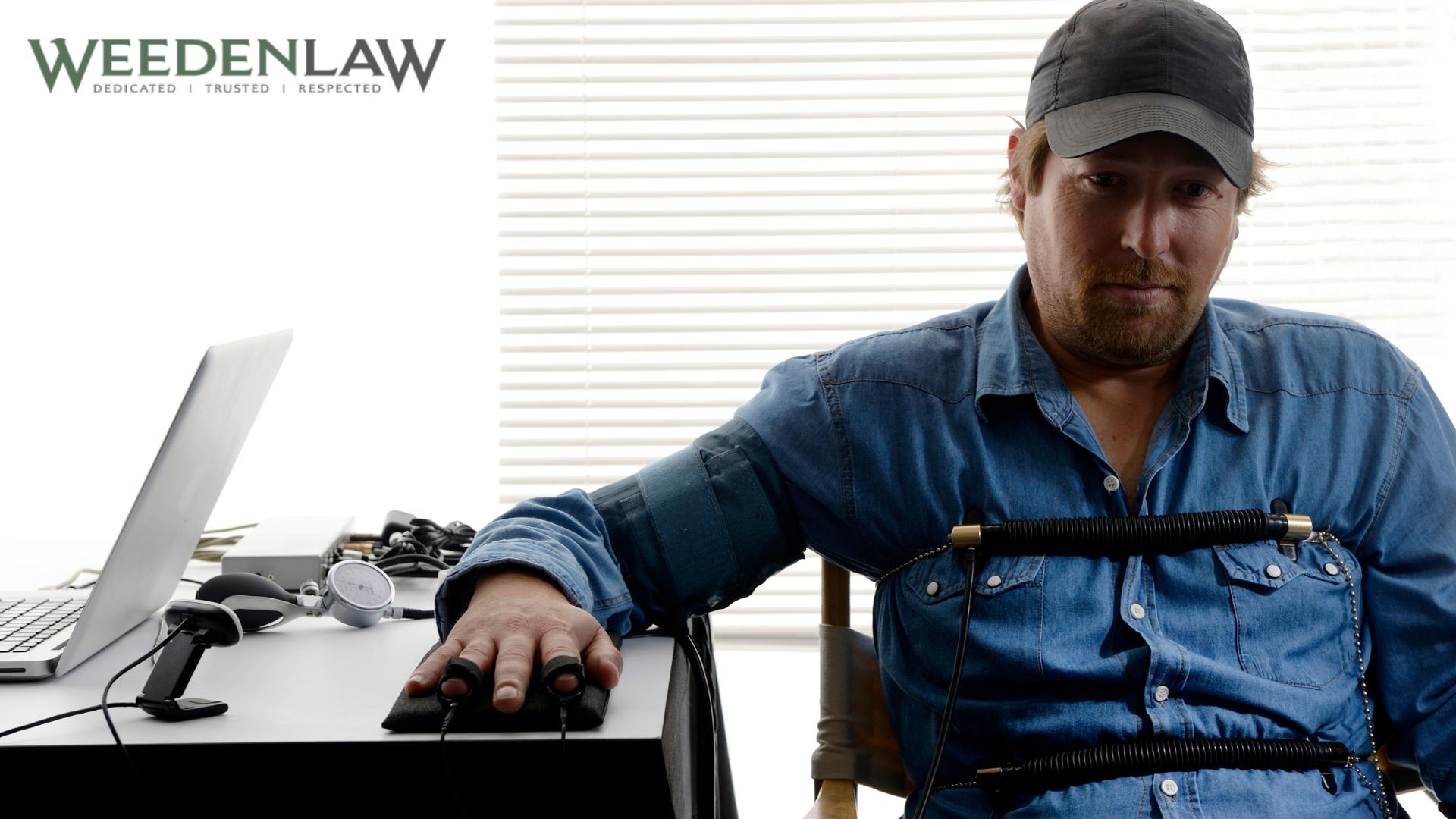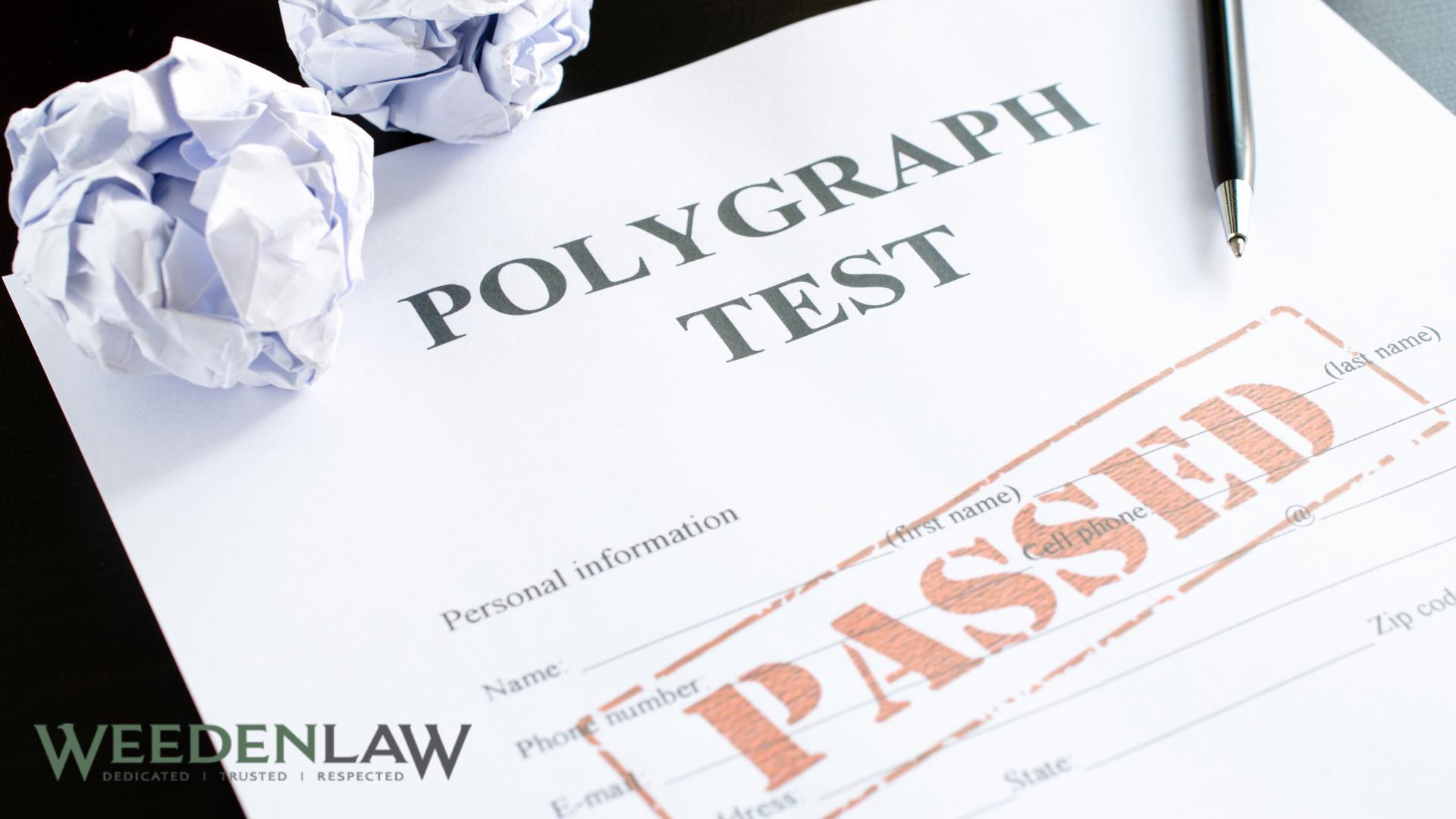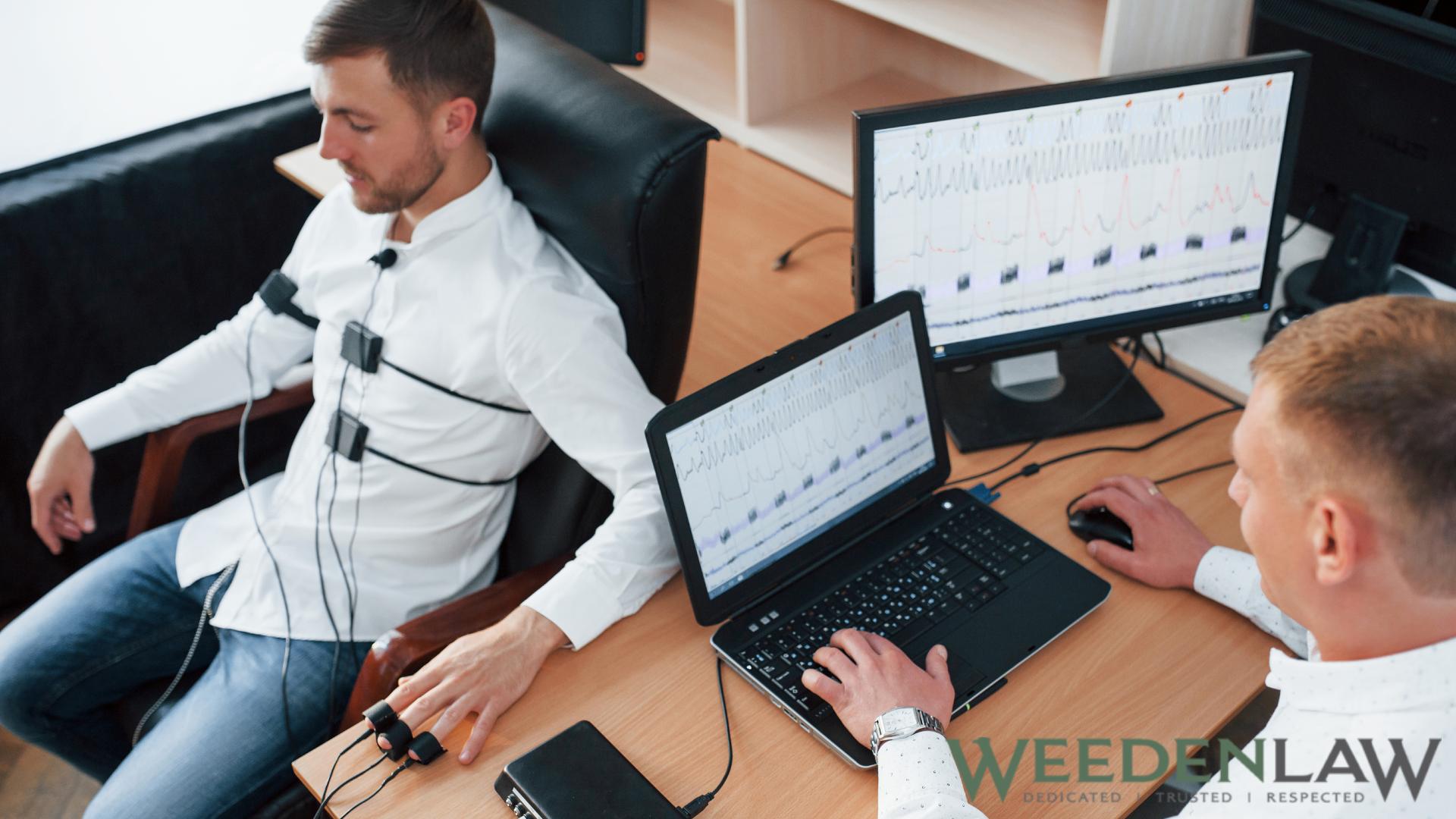The Role of Polygraph Tests in Denver, Colorado
Colorado criminal defense attorney Jeff Weeden understands the pivotal role that polygraph tests can play in legal proceedings. The admissibility of polygraph examination results in Colorado’s courts and criminal investigations is a matter of significance and complexity.
At WeedenLaw, our dedicated team of seasoned criminal defense lawyers recognizes that while polygraph tests are employed as tools for truth verification, their admissibility remains contingent upon a range of factors, with the most important being the courts’ evaluation of their reliability and relevance.
Through meticulous research and analysis, our criminal defense team meticulously evaluates the circumstances surrounding each case to determine whether polygraph examination results can be presented as scientific evidence in court.
With an unwavering commitment to our client’s rights, WeedenLaw is well-equipped to navigate the complex landscape of polygraph admissibility and to provide the strategic legal guidance needed to achieve justice in Denver’s legal landscape.
Controversy Surrounding the Courtroom Admissibility of Polygraph Results
As a seasoned criminal defense lawyer, Attorney Jeff Weeden is well-versed in the issue surrounding the admissibility of polygraph examinations in courtroom proceedings. The controversy lies in the intersection of scientific evidence, law, and the pursuit of justice.
Polygraph examinations, commonly known as polygraph tests or lie detector tests, rely on electrical signals from the polygraph machine. They are designed to measure physiological responses that indicate truthfulness or deception.
While the question of “are polygraphs admissible in court” is easy, the question of whether polygraph results should be admissible as evidence in courtrooms, particularly in our great state of Colorado, is a subject of ongoing debate.
The scientific community remains divided on the validity of polygraph examination results. Critics of the ‘polygraph test admissible in court’ side raise concerns about the reliability and accuracy of lie detector tests. Some experts argue that various physiological responses, such as anxiety or blood pressure, can lead to false positives or false negatives. Additionally, the subjective interpretation of polygraph results and the lack of standardized procedures add to the complexity of incorporating polygraph evidence into Colorado’s legal proceedings.
So, Are The Polygraphs Admissible?
In Colorado, the admissibility of polygraph results varies depending on factors such as the judge’s discretion, the nature of criminal and civil cases, and the relevance of such a test to the issues at hand.
Judges often weigh the potential prejudicial impact of introducing polygraph evidence against its overall value. Given the potential for unreliable outcomes and the potential for undue influence on juries for such evidence, the admissibility of polygraph results remains a contentious subject.
As an advocate for due process and a fair legal system, Jeff Weeden understands the importance of scrutinizing all forms of evidence, including polygraph evidence. Whether defending criminal cases or providing legal guidance, it is WeedenLaw’s legal obligation to ensure the pursuit of justice is grounded in the most accurate and reliable information available.
If you are facing a criminal investigation in Colorado and seeking guidance on the admissibility of polygraph evidence, Denver criminal defense attorney Jeff Weeden is here to provide knowledgeable insights and dedicated legal representation tailored to your unique criminal case.
Polygraph Tests: Basics and Functionality
Exploring the Science Behind a Polygraph Examination
Polygraph tests, commonly known as lie detector tests, rely on measuring a person’s bodily responses as an investigative tool. So, the polygraph examiner, or the person administering the polygraph test, relies on physiological indicators such as heart rate, blood pressure, and respiration to determine the previously mentioned truthfulness or deception.
The concept is rooted in the assumption that lies induces measurable changes in these physiological indicators, as one or more emotions should cause the blood pressure and heart rate to spike. However, many science experts remain divided on the accuracy and reliability of such test results.
At WeedenLaw, we acknowledge that the interpretation of lie detector test results is far from straightforward. The relationship between physiological responses like blood pressure and truthfulness is complex, and factors such as anxiety, stress, or medical conditions can influence the outcome. Furthermore, individual variations in physiological responses can also complicate the accuracy of the polygraph examination results, especially for the wrongfully accused. Critics point to these variables as potential sources of a false positive or negative, rendering the reliability of the polygraph test subject to scrutiny.
With a commitment to upholding justice and ensuring fair legal proceedings, even while the polygraph test is generally accepted in some cases, Jeff Weeden navigates the complexities of each polygraph test with a critical eye. For those facing criminal investigations in Colorado and seeking informed legal counsel regarding the admissibility of polygraph evidence, Jeff Weeden offers a wealth of experience and a diligent pursuit of truth for his clients.
How a Polygraph Test Works as a Lie Detector Test
Polygraph examinations operate by monitoring a person’s physiological responses while they answer a series of questions. Sensors attached to the individual are set to record blood pressure and other involuntary bodily changes. The “expert opinion” is that when a person is deceptive, their stress levels tend to increase, resulting in measurable physiological indicators.
These fluctuations, believed to be indicative of dishonesty, are then interpreted by a trained polygraph examiner to determine if deception is present.
In contrast, Weeden underscores the nuanced nature of polygraph exam interpretation. Variables such as an individual’s baseline physiological responses, personal anxiety levels, and even cultural variations can introduce complexity and ambiguity into the assessment of lie detectors.
As a knowledgeable Colorado criminal defense attorney, Weeden provides a balanced perspective on the mechanisms of the polygraph test, empowering those facing criminal investigations in Colorado with a comprehensive understanding of the considerations surrounding their potential admissibility in court.

Legal Precedents and Admissibility
Legal precedents vary from jurisdiction to jurisdiction and can significantly impact the admissibility of polygraph evidence. Some Colorado courts have adopted a cautious approach, emphasizing the potential unreliability of polygraph tests in creating reasonable doubt, while other courts may be more open to admitting polygraph evidence under specific circumstances.
As a criminal defense lawyer, Weeden’s role involves meticulously researching and understanding relevant legal precedents to craft persuasive arguments regarding the admissibility of polygraph results. By leveraging a deep understanding of both legal principles and scientific complexities, an experienced Denver criminal defense attorney like Jeff Weeden can strategically navigate the existing legal framework to ensure that the accused’s rights are safeguarded and that they receive a fair trial.
The Burden of Proof: Challenges in Establishing Polygraph Reliability
When it comes to establishing the reliability of a lie detector test as credible science or other evidence in court, the complexities are substantial. A skilled Colorado criminal defense lawyer, well-versed in the nuances of federal and state laws, is required to navigate these legal challenges effectively.
For a polygraph test to be considered reliable and admissible in a Colorado courtroom, the burden of proof rests on those seeking to introduce its results as evidence. So, if the expert testimony is to be used in the prosecutor’s arguments, the burden of proof lies with the prosecution.
This entails presenting a compelling case (for both civil cases and criminal cases) that the science underpinning the lie detector test is both robust and dependable. The challenge lies not only in establishing the scientific foundation of lie detectors but also in addressing the concerns raised by the judge and jury.
The variability of physiological responses, the potential for a false positive or negative for those who take a polygraph, and the influence of external variables all contribute to the complexity of meeting this burden of proof in Colorado. Well-versed in the intricacies of courtroom dynamics and scientific discourse, Jeff Weeden can guide clients before they agree to take a polygraph test.
Expert Testimony and Polygraph Results
The Role of Expert Witnesses in Presenting Polygraph Evidence
Expert opinion is instrumental in establishing the reliability and validity of polygraph examinations in courtroom proceedings. They provide a comprehensive understanding of the science behind polygraph examinations and educate judges and juries about the methodology, accuracy, and limitations of these tests.
Expert testimony helps contextualize the polygraph results within the legal framework. With a keen awareness of local and federal rules, Weeden’s role as a criminal defense lawyer includes identifying and collaborating with seasoned expert witnesses who can effectively present the science behind polygraph tests while addressing potential challenges raised by the prosecution.
By presenting a well-informed statement in the criminal case, expert witnesses not only enhance the credibility of polygraph evidence but also contribute to the court’s understanding.
At WeedenLaw, we strive to ensure that client’s rights are protected, that their case is presented in the most comprehensive manner possible, and that the court is equipped to make an informed decision regarding the admissibility of polygraph evidence for your case specifically.
Factors Influencing the Weight Given to Polygraph Testimony
One of the primary factors influencing the weight given to a polygraph examination is the scientific reliability of the lie detector test itself.
Courts often scrutinize the accuracy of lie detector tests, considering factors such as the training and expertise of the person administering the test, the standardization of testing procedures, and the quality of the polygraph machine used.
Another critical factor in assessing the weight of lie detector tests is the legal precedent within Colorado and the Supreme Court. Previous decisions and interpretations of laws can influence how judges view the credibility of polygraph evidence. The degree to which polygraph evidence has been allowed or excluded in past cases can set a precedent that informs a judge’s decision in current cases.
Additionally, a judge may consider the persuasive arguments presented by both the prosecution and the defense regarding the admissibility of polygraph evidence, assessing whether its probative value outweighs potential prejudice.

Alternative Uses of Polygraph Results
Beyond their potential admissibility as evidence in court, a polygraph test can serve alternative purposes within the legal landscape.
While lie detector tests may not always find a way into the courtroom, they can still play a role in shaping strategies and negotiations. For instance, a polygraph examination can influence pretrial discussions and can sway the prosecution in settlement talks.
In these scenarios, the strategic use of lie detector tests can impact the trajectory of legal proceedings outside the courtroom, all within the context of Colorado’s legal system.
Pretrial Negotiations: Role of Polygraph Test Results in Settlement Talks
Polygraph examination results can serve as a strategic tool during settlement talks, especially when both parties recognize the uncertainty and potential risks associated with proceeding to trial. When one side presents a polygraph test to support their version of events, it can incentivize opposing parties to reassess their positions, especially with limited state resources. The inclusion of polygraph evidence in settlement discussions can underscore the seriousness of a defense’s commitment to its claims and potentially sway negotiations toward a more favorable resolution.
As a seasoned Colorado criminal defense attorney, Weeden approaches pretrial negotiations with an understanding of the potential impact of polygraph evidence if his client were to take a polygraph examination. By leveraging this unique angle, he can achieve optimal outcomes for clients.
While the polygraph evidence may not have a guaranteed impact on the courtroom, the influence in pretrial negotiations shows the strategic value it holds in settlement talks. By presenting compelling polygraph evidence during these discussions, both the prosecution and defense can shape the perception of their case’s strength and enhance their negotiating position.
At WeedenLaw, the goal is to leverage every available avenue to secure favorable outcomes, such as a favorable plea deal or dropped charges from the falsely accused. The strategic use of polygraph evidence is just one of the many tools to achieve this objective within the confines of Colorado law.
Sentencing Considerations: Impact of Polygraph Testimony on Judgments
If the defendant agrees to take a polygraph, these results can present an alternate perspective on a defendant’s truthfulness and remorse, both of which are factors that judges often take into account during sentencing.
While polygraph evidence alone may not dictate the judgment, it certainly can contribute to the overall narrative presented to the court.
In some criminal cases, judges may consider the results of polygraph tests as part of a comprehensive view of the defendant’s character. By strategically presenting polygraph evidence during the sentencing phase, Weeden can convey valuable insights that may positively influence judgments, resulting in more favorable sentencing outcomes for clients.
Understanding the nuances of utilizing a polygraph test in the sentencing phase is crucial. Leveraging polygraph evidence within the context of the client’s overall case helps to present a holistic picture that can guide judges toward fair and just sentencing decisions in accordance with Colorado’s legal landscape.

Is the polygraph test admissible in a Colorado court?
The answer is typically influenced by several factors, including reliability, legal precedent, and the rules of such evidence.
By strategically navigating the complex landscape of polygraph test admissibility, our Colorado defense attorneys aim to ensure client’s rights are upheld. We approach each case with a commitment to comprehensive research, strategic planning, and the informed use of polygraph evidence within Colorado’s legal proceedings to achieve the best possible outcomes for clients.
Balancing Truth-Seeking and Procedural Fairness in the Courtroom
With a deep understanding of both the scientific principles of polygraph examinations and the nuances of Colorado’s legal system, WeedenLaw is equipped to advise clients on whether or not to take a polygraph test, as well as the potential role of the polygraph examination in their defense strategy.
Whether polygraph results are admissible or not, Weeden’s focus remains on pursuing every avenue to ensure clients’ rights are upheld.
If you’re seeking an experienced criminal defense law firm that understands the complexities of the admissibility of lie detector tests and the potential impact on your case, reach out and explore how WeedenLaw offers personalized, effective legal guidance in your time of need. You can reach us by giving us a call at (720) 307-4330 or contacting us online today for a free consultation.














